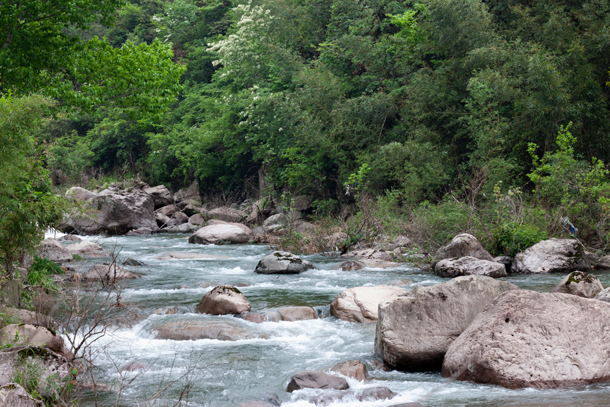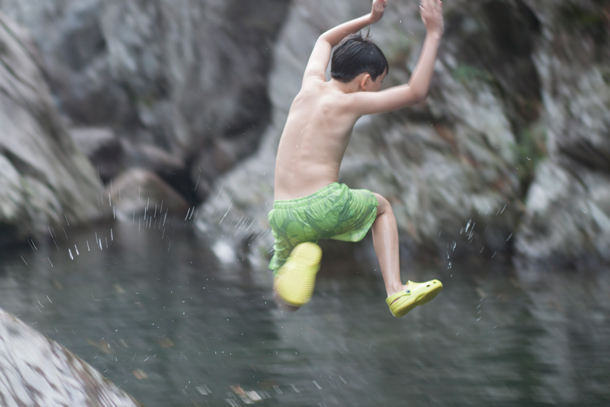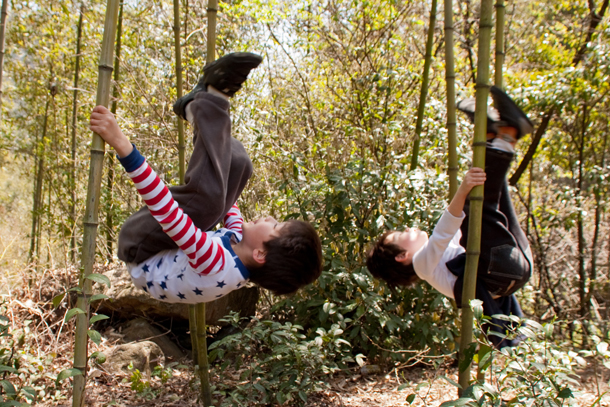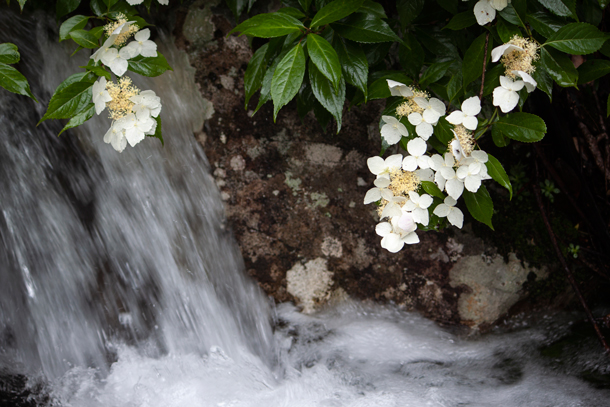The Place Where You Live: Tianmushan, China
Air Date: Week of February 21, 2020

A river at flood stage in Tianmushan, Zhejiang Province, China. (Photo: Lindsay Shen)
Living on Earth gives a voice to Orion Magazine’s longtime feature in which readers write about the places they call home. This week Lindsay Shen writes about the refuge her family found in the cool, clear streams of the mountain village of Tianmushan, China.
Transcript
CURWOOD: Now a trip to China for another installment in the occasional Living on Earth/Orion Magazine series “The Place Where You Live.” Orion invites readers to put their homes on the map and submit essays to the magazine’s website, and we’re giving them a voice.
[MUSIC: Edward Sharpe and The Magnetic Zeroes “Home” from Edward Sharpe and The Magnetic Zeroes (Rough Trade Records 2009)]
CURWOOD: Today’s essay by art historian Lindsay Shen takes us to the cool
mountain streams of Tianmushan, in Zhejiang Province.
[MUSIC]
[SOUNDS OF WATER RUSHING]
SHEN: The intelligent find joy in water. If Confucius is right, we must all be prodigies.
We moved to this mountain village, a three-hour drive from our home in Shanghai, because of the water, because of the air, because the inner-city pollution was quite literally making us sick. In moving to the country-side we were swimming against the tide; rural villages in China are draining, as young people migrate to the city for work. We joined a small trickle headed upstream, closer to the source of water.
Water isn’t magnetic, but it draws us to itself. All summer we swim in cool, deep channels, caressed by water heavy as silk. We slide down slick rockfaces into churning whirlpools. We climb to the sources of springs to collect water sweet to drink and fragrant with minerals. Outside Buddhist temples, we cleanse our hands and faces and souls with water.

Tianmushan is home to a UNESCO Biosphere Reserve. (Photo: Lindsay Shen)
[FROG SOUNDS]
SHEN: Later, we rescue frogs and turtles from the reservoir, half-believing their salvation earns us merit. Most of the time, living in this place feels like a respite from environmental woe; sometimes though we feel like we’re living on the front line. When we started visiting in 2007, the drive led through a village stacked with bales of garbage. The acrid smell of burning plastic seemed a defilement. After the massive typhoons that swept over the mountains each August, we would find the trees along the swollen rivers snagged with plastic, like multi-colored bunting for some dark parade. Once, playing with my two young sons ankle-deep in a stream, I caught sight of a young water serpent—delicious but deadly. Then realised, as it twisted downstream, that it was a plastic catheter attached to a needle, a dispatch of medical waste from some faraway place.
[MUSIC]

Lindsay Shen’s two young sons love to play in the clear pools of Tianmushan’s rivers. (Photo: Lindsay Shen)
SHEN: I attended village meetings where residents vented their frustrations. Such meetings were a tiny part of the collective anger and grief washing over China. The country’s later decision to restrict the waste it imported for recycling might be forcing other countries to look inward and confront their own consumption. But in places like Tianmushan it’s rare now to smell burning plastic. And common to share joy in water.
[MUSIC]
[SOUNDS OF WATER CONTINUE]
SHEN: When we saw Tianmushan, I think we were just immediately smitten, not only because it's a beautiful place, it's very mountainous. It's actually a UNESCO Man and Biosphere Reserve because of all of the rare species of plants and animals that are there in the mountain. In China, many of the main Buddhist temples have these historic documents associated with them, they’re the temple gazetteers. The one for Tianmushan talks about the water and how the waters of Tianmushan connect it to all of the sacred mountains throughout China. And so that was just another opportunity to really seep ourselves into the culture and spirituality of the place. Actually, in one summer, the water dried up, the drinking springs dried up, which seemed absolutely incredible because our whole experience of being at Tianmushan was of being surrounded by water, you know, gushing waterfalls, streams all around. We go to sleep to the sound of water, we play all day to the sound of water. And so it was incredible that the streams just dried up. There wasn't enough drinking water for everyone, and I think that was what probably precipitated the angriest meeting.

Tianmushan means “heaven’s eye mountain” because it has pools that look up to heaven. In a happy coincidence, Shen and her husband had named their sons Tian Yu, which means “rain from heaven”, and Tian Bai, which means “bright heaven”, before they knew of the existence of Tianmushan, so she says moving there felt like it was destined. (Photo: Lindsay Shen)
[MUSIC]
SHEN: However, I think that the displeasure was so great, that actually the willingness of those villagers to be vocal and to be heard has made an impact. There's such public support because people understand that their children need to grow up in a healthy environment.
CURWOOD: Lindsay Shen is an art historian in the mountains of Tianmushan, China. To learn how you can submit an essay for the Orion Magazine series the place where you live go to the living on earth website, loe.org.

Tianmushan’s wet climate supports lush plant life. (Photo: Lindsay Shen)
Links
Living on Earth wants to hear from you!
Living on Earth
62 Calef Highway, Suite 212
Lee, NH 03861
Telephone: 617-287-4121
E-mail: comments@loe.org
Newsletter [Click here]
Donate to Living on Earth!
Living on Earth is an independent media program and relies entirely on contributions from listeners and institutions supporting public service. Please donate now to preserve an independent environmental voice.
NewsletterLiving on Earth offers a weekly delivery of the show's rundown to your mailbox. Sign up for our newsletter today!
 Sailors For The Sea: Be the change you want to sea.
Sailors For The Sea: Be the change you want to sea.
 The Grantham Foundation for the Protection of the Environment: Committed to protecting and improving the health of the global environment.
The Grantham Foundation for the Protection of the Environment: Committed to protecting and improving the health of the global environment.
 Contribute to Living on Earth and receive, as our gift to you, an archival print of one of Mark Seth Lender's extraordinary wildlife photographs. Follow the link to see Mark's current collection of photographs.
Contribute to Living on Earth and receive, as our gift to you, an archival print of one of Mark Seth Lender's extraordinary wildlife photographs. Follow the link to see Mark's current collection of photographs.
 Buy a signed copy of Mark Seth Lender's book Smeagull the Seagull & support Living on Earth
Buy a signed copy of Mark Seth Lender's book Smeagull the Seagull & support Living on Earth

